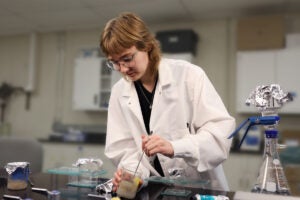The College of Education attracted more than 100 national education policymakers and corporate leaders for a conference that addressed sweeping improvements needed in K-12 education and to develop recommendations for a new model of teacher education.
The focus was to prepare a future workforce for a global, technology-based society and address questions such as:
- What are the key characteristics of effective teachers for digital age learners?
- What are the critical elements of teacher education programs that will produce instructors with those characteristics?
- What barriers prevent these programs from being implemented?
- What policy and action recommendations can we make that will eliminate the barriers and accelerate creation of a new model for teacher education?
The conference, titled “Redefining Teacher Education for Digital Age Learners,” was hosted by the College of Education’s Learning Technology Center (LTC), and funded by Promethean, makers of ActivBoard interactive whiteboards.
“Representative stakeholders from state legislatures, professional associations and state certification boards, as well as teachers, teacher educators and educational technologists took part in the conversation,” said Dr. Paul E. Resta, LTC director and co-chair of the summit. “It was incredible just to have all of these leaders in one place.
“During the summit, they developed a shared vision on the need to change the traditional paradigm of teacher education and to create a new model to prepare the education work force of the 21st century.”
The summit also introduced and implemented the latest in technology to help facilitate discourse. Discussion groups input themes and decisions into Google Docs, and major ideas were then projected on a Promethean Activboard. Summit participants rated their importance with hand-held response units to garner consensus.
Recommendations for education policy change at the institutional, state and national level are being created and will capitalize on new trends such as the digital technology skills of today’s young teachers, continuous training and evolution of skills, and alternative pathways to teaching.
A report containing the recommendations will be presented at a congressional reception in Washington, D.C., in the spring and shared with education policymakers and leaders around the country.
Access conference videos and resources online.



